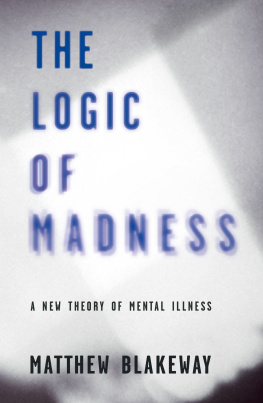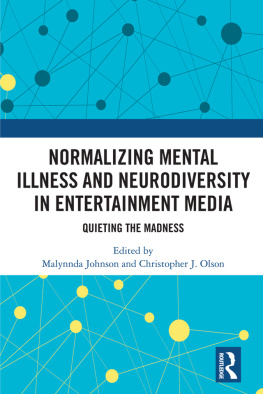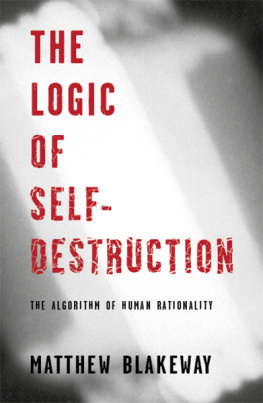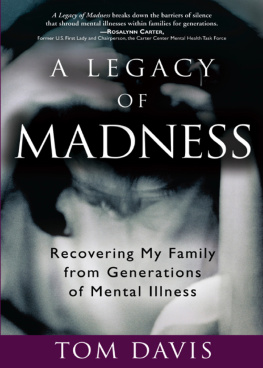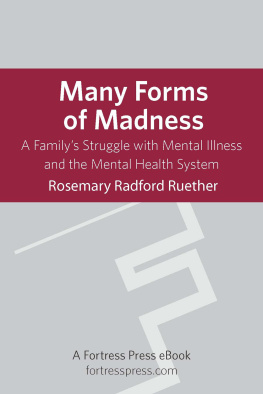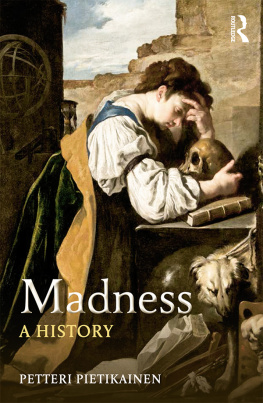Blakeway - Logic of Madness : A New Theory of Mental Illness
Here you can read online Blakeway - Logic of Madness : A New Theory of Mental Illness full text of the book (entire story) in english for free. Download pdf and epub, get meaning, cover and reviews about this ebook. publisher: Lightning Source Inc, genre: Religion. Description of the work, (preface) as well as reviews are available. Best literature library LitArk.com created for fans of good reading and offers a wide selection of genres:
Romance novel
Science fiction
Adventure
Detective
Science
History
Home and family
Prose
Art
Politics
Computer
Non-fiction
Religion
Business
Children
Humor
Choose a favorite category and find really read worthwhile books. Enjoy immersion in the world of imagination, feel the emotions of the characters or learn something new for yourself, make an fascinating discovery.
Logic of Madness : A New Theory of Mental Illness: summary, description and annotation
We offer to read an annotation, description, summary or preface (depends on what the author of the book "Logic of Madness : A New Theory of Mental Illness" wrote himself). If you haven't found the necessary information about the book — write in the comments, we will try to find it.
Blakeway: author's other books
Who wrote Logic of Madness : A New Theory of Mental Illness? Find out the surname, the name of the author of the book and a list of all author's works by series.
Logic of Madness : A New Theory of Mental Illness — read online for free the complete book (whole text) full work
Below is the text of the book, divided by pages. System saving the place of the last page read, allows you to conveniently read the book "Logic of Madness : A New Theory of Mental Illness" online for free, without having to search again every time where you left off. Put a bookmark, and you can go to the page where you finished reading at any time.
Font size:
Interval:
Bookmark:

THE LOGIC OF
MADNESS
A New Theory of Mental Illness
MATTHEW BLAKEWAY
MEYER LEBOEUF
Contents
Before Charles Darwin, a biologist was a chap with a beard and a top hat who tramped through the jungles of Africa. He collected specimens and stuffed them to take home. If he collected anything that nobody with a top hat had seen before, he claimed to have discovered it and gave it a Latin name. When he had collected enough specimens, he could classify them into families, genera and ordersall with Latin names. Darwins impact was so colossal that it seems reasonable to suggest that biology did not really exist beforehand. It is quite laughable that the mere collection of the racks of specimens that still exist in the basements of our natural history museums was once considered to be science.
Today, a psychiatrist is a physician who tramps through the jungle of a major hospital. They collect specimens of human self-destruction and give them Latin names. When they have enough names, they classify them into groups. Giving names to phenomena for which no explanation exists is no more scientific than it would be if I classified a night-time squeaky floorboard as a ghost. It is quite surprising that psychiatrists do not have top hats, although beards are still in vogue. Many psychiatrists are aware of the scientific limitations in what they do. I met a former psychiatrist who became a general medical practitioner. When I asked him why, he told me that he could diagnose most of his psychiatric patients in five minutes, but then would spend the rest of the session knowing he could do nothing to help them.
Reading various historical surveys of madness, it is astounding how little has changed in our understanding of mental illness. We regularly change names to make them sound more scientific or to appear as medical diagnoses, and this disguises the fact that we still really do not understand how they work. For example, we have stopped calling it shell shock and now call it post-traumatic stress disorder, but there is still little idea of the structure of this condition. We no longer talk of maladies of the spirit, but happily distinguish between obsessive-compulsive disorder and obsessive-compulsive personality disorder, and still there is no consensus as to what is going on underneath.
We have replaced terms such as insanity or madness with mental illness because this sounded less derogatory and more medical. But, when it became clear that we could not demonstrate something wrong with the physical or chemical working of the body or brain, we started to doubt that these were true medical illnesses; so now we prefer to term them as mental disorders. This, of course, presumes that the word mental has a clear agreed meaning. But if you read the philosophical literature on problems of mind or free will, you will notice that it certainly does not. It also presumes that such conditions are disordered and, as I hope to show, they actually have a definable order. In past centuries, the bourgeoisie would go to mental hospitals (that were really prisons) to look at the insane as a sort of respectable amusement. These days, we would consider such voyeurism to be abhorrent, but the prejudice surrounding mental illness has hardly abated and we prefer these things to be swept out of sightso has this really changed?
In America, the bible of psychiatry is called the Diagnostic and Statistical Manual of Mental Disorders, Fifth Edition (which I refer to as DSM-V and for earlier editions I refer to DSM-IV, DSM-III or DSM-II as applicable, or I refer to them collectively as DSM). The title is perhaps a giveaway, but this book does little more than describe symptoms, classify them together in correlated groups and give them names. Outside America, the standard reference is the International Statistical Classification of Diseases and Related Health Problems, 10th Revision (which I refer to as ICD10), produced by the World Health Organization. Throughout this book, I will refer mostly to DSM. In sciences like physics and biology where the extent of our knowledge is vast, scientists tend to be open and honest about what they do not understand. By contrast, in psychiatry we understand very little about the mechanisms of the conditions that scientists observe. This relative lack of knowledge makes specialists in the field a little defensive. It is one of the universal rules of science that if you are unable to explain something, you give it a Latin name, so that you can sound erudite even when selectively ignorant. You are now deemed an expert, and you get to write the speculative obfuscatory description of its causes sprinkled with words like epiphenomenal.
The aim of this book is to create a hypothetical theoretical framework of what mental illness actually is. In The Logic of Self-Destruction, I explained that self-destructive actions are rationally derived. To do this, I described an algorithm of how a human computes an action. The transition from ordinary human self-destruction to mental illness requires us to develop these ideas to a higher level of complexity. Mental illness is self-destruction taken to the next dimension. When a cue ball strikes a billiard ball, it flies off in a predictable direction. If the billiard ball is simultaneously struck by two cue balls, the two causes combine to produce one effect and mechanics permits us to predict in which direction the billiard ball will travel. If a self-destructive action is the rational consequence of manipulated emotional behaviour that started out as a tactical deception, what happens if behaviour is manipulated in two different ways simultaneously? This combination should not cause two self-destructive actions, but a single one, and it is a safe bet that it will be more seriously self-destructive. To work out what this looks like, we have to consider how the two causes combine, and compute the effect. In this way, we can predict self-destructive actions of a higher degree of complexity.
Even psychiatrists sometimes describe their patients as being irrational, but the concept of irrationality is scientifically so incoherent that it is not even wrong. My aim is to demonstrate that all the symptoms described in the DSM can be derived logically. Even the mad are rational. I may not complete my intended task, but even getting halfway could reorient how we understand mental illness and this step could be the beginning of psychiatry as a scientific discipline with an explanatory causal theory.
I am attacking the idea of mental illness and placing patterns of extreme self-destructiveness into a broad spectrum of what makes us human. Having obsessive-compulsive disorder, being a member of the Tea Party, being a Hindu, and being in love with someone who abuses you are all obsessive-compulsive. Comparisons between religious belief, radical ideology and mental illness have been frequently made (for example, by Sam Harris). Nothing gives a psychiatrist the right to call any one of these a disorder (except of course their self-granted right), and nothing gives Richard Dawkins the right to hold religious people up for ridicule. As far back as the nineteenth century, doctors included being too religious as a category of mental illness, so today they could also include being politically left wing, and the psychiatric profession in China could include being right wing.
The thesis of this book is that madness is logical in structure; not psycho-or neuro-logical, but plain old-skool logical. This is the way that Aristotle would understand itone of the earliest thinkers from ancient Greece to set out a formal description of logic. Psychiatry, like pre-Darwinian biology, is pre-scientific in that it describes phenomena without having any convincing, explanatory theory. This book provides an explanatory theory, but a surprising conclusion of this book is how much psychiatry got right without any theory of causality. That is because being
Next pageFont size:
Interval:
Bookmark:
Similar books «Logic of Madness : A New Theory of Mental Illness»
Look at similar books to Logic of Madness : A New Theory of Mental Illness. We have selected literature similar in name and meaning in the hope of providing readers with more options to find new, interesting, not yet read works.
Discussion, reviews of the book Logic of Madness : A New Theory of Mental Illness and just readers' own opinions. Leave your comments, write what you think about the work, its meaning or the main characters. Specify what exactly you liked and what you didn't like, and why you think so.

